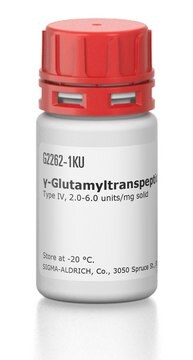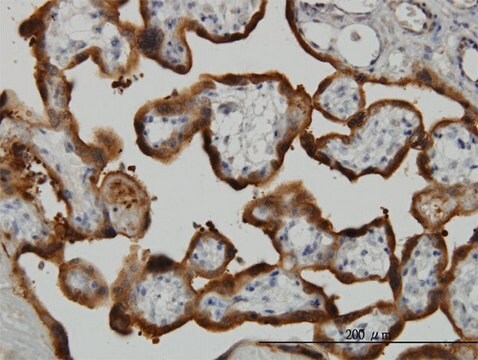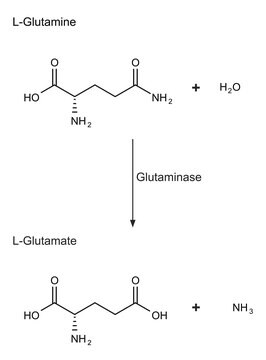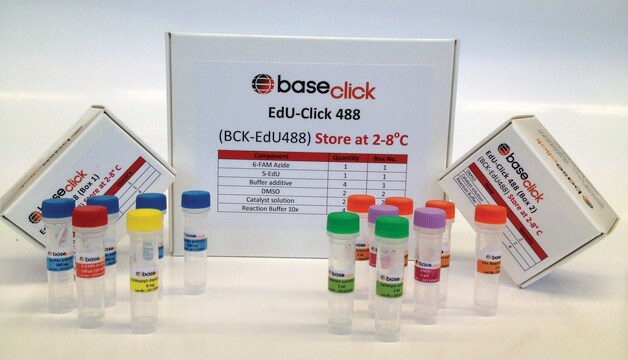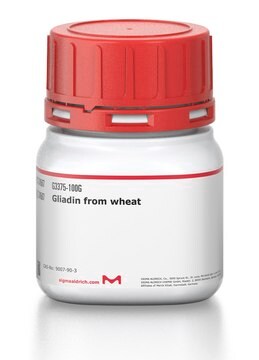T0581
Transglutaminase from guinea pig liver
≥1.5 units/mg protein, recombinant, expressed in E. coli
Sinonimo/i:
TGase
Autenticatiper visualizzare i prezzi riservati alla tua organizzazione & contrattuali
About This Item
Prodotti consigliati
Ricombinante
expressed in E. coli
Livello qualitativo
Attività specifica
≥1.5 units/mg protein
Condizioni di spedizione
dry ice
Temperatura di conservazione
−20°C
Applicazioni
10 mM calcium chloride is used for activation of the enzyme.
Transglutaminase has been used in a study to improve quantifiable assays to fully characterize the role of transglutaminase in diseases such as Huntington′s disease and Alzheimer′s disease.Transglutaminase has also been used in a study to develop a nonradioactive dot blot assay for transglutaminase activity.
Definizione di unità
One unit will catalyze the formation of 1.0 μmole of hydroxamate per minute from Nα-Z-Gln-Gly and hydroxylamine at pH 6.0 at 37 °C. (L-Glutamic acid γ-monohydroxamate is the standard.)
Stato fisico
Lyophilized from 10 mM NaH2PO4, 150 mM NaCl, pH 8. Contains maltodextrin.
Avvertenze
Warning
Indicazioni di pericolo
Consigli di prudenza
Classi di pericolo
Eye Irrit. 2
Codice della classe di stoccaggio
11 - Combustible Solids
Classe di pericolosità dell'acqua (WGK)
WGK 3
Punto d’infiammabilità (°F)
Not applicable
Punto d’infiammabilità (°C)
Not applicable
Scegli una delle versioni più recenti:
Certificati d'analisi (COA)
Lot/Batch Number
Non trovi la versione di tuo interesse?
Se hai bisogno di una versione specifica, puoi cercare il certificato tramite il numero di lotto.
Possiedi già questo prodotto?
I documenti relativi ai prodotti acquistati recentemente sono disponibili nell’Archivio dei documenti.
I clienti hanno visto anche
T S Emundianughe
Indian journal of experimental biology, 27(2), 160-162 (1989-02-01)
The metabolism of benzoic acid was examined in S. mansoni infected CBA mouse. The result showed that control animals dosed with 150 mg/kg benzoic acid resulted in urinary excretion of two metabolites, hippuric acid and benzoic acid glucuronide. Administration of
C M Becker et al.
Archives of biochemistry and biophysics, 223(2), 381-392 (1983-06-01)
Valproic acid (dipropylacetic acid), an antiepileptic agent known to be hepatotoxic in some patients, caused inhibition of lactate gluconeogenesis, fatty acid oxidation, and fatty acid synthesis by isolated hepatocytes. The latter process was the most sensitive to valproic acid, 50%
M Kelley et al.
Biochemical pharmacology, 35(2), 289-295 (1986-01-15)
The amino acid conjugation of the phenoxyherbicides 2,4-dichlorophenoxyacetate (2,4-D) and 2,4,5-trichlorophenoxyacetate (2,4,5-T) by animals was examined at the level of the enzymes catalyzing the reactions. The phenoxyherbicides were not substrates for the bile acid conjugating system but were substrates for
I A Qureshi et al.
Biochemistry international, 19(3), 657-666 (1989-09-01)
The development of the hepatic and renal hippurate-synthesizing system, as represented by the overall reaction of the benzoyl CoA: glycine N-acyltransferase (EC 2.3.1.13) was studied in 0, 4, 8, 13, 17, 21-day and 8-week old sparse-fur (spf) mutant mice with
S Kølvraa et al.
Biochemical medicine and metabolic biology, 36(1), 98-105 (1986-08-01)
Prompted by the fact that the urinary excretion of organic acids in the riboflavin-deficient rat closely mimics that found in patients with inborn errors in the acyl-CoA dehydrogenation systems, the organelle localization and the apparent kinetic constants (Km and Vmax
Il team dei nostri ricercatori vanta grande esperienza in tutte le aree della ricerca quali Life Science, scienza dei materiali, sintesi chimica, cromatografia, discipline analitiche, ecc..
Contatta l'Assistenza Tecnica.


